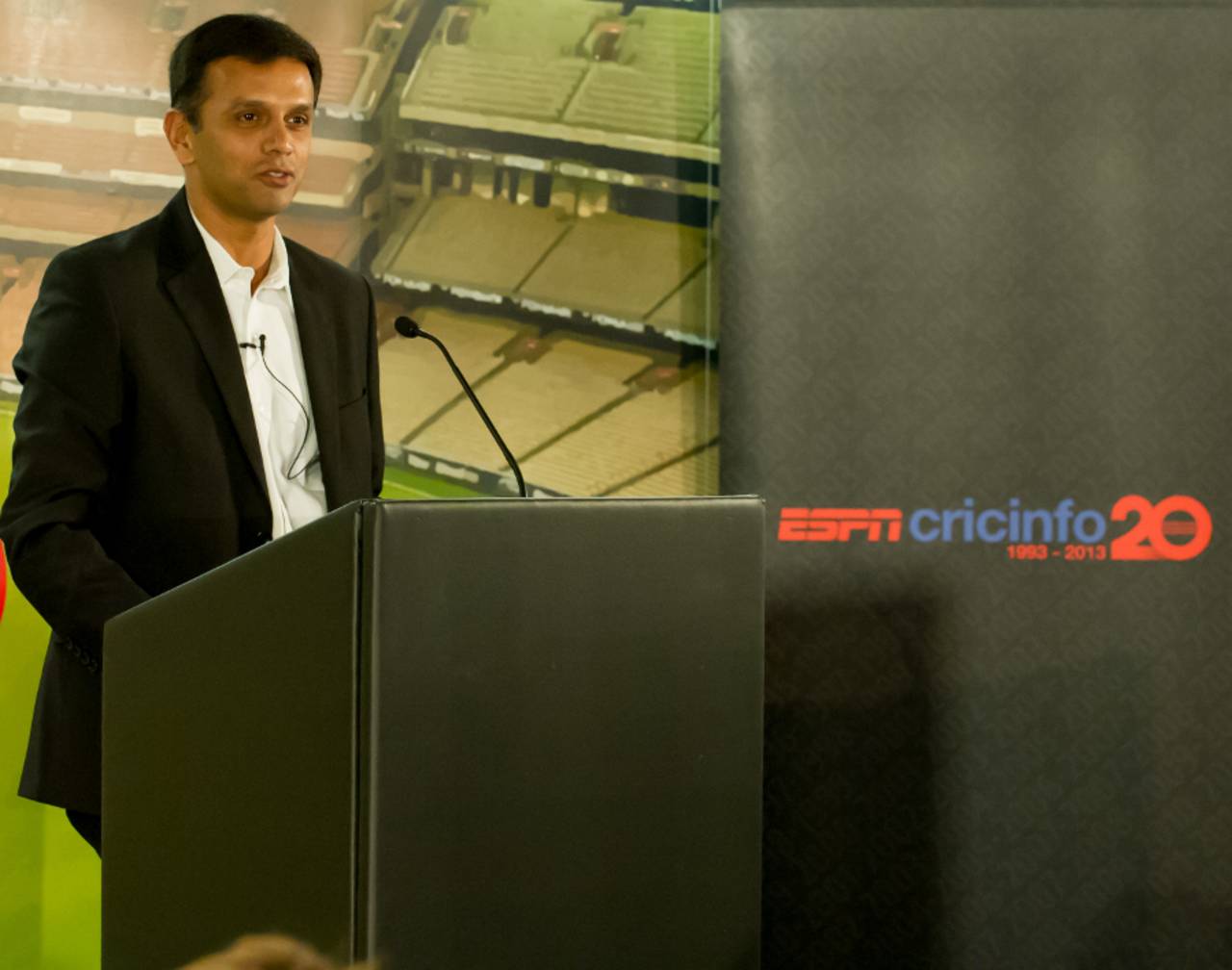Make sports cheating a criminal offence - Dravid
A law against sports fraud that offers real consequences of "jail time" could well be the deterrent for athletes in the fight against corruption in sports, former India captain Rahul Dravid has said
Sharda Ugra
Nov 12, 2013, 8:05 PM

'The question is no longer whether the law must intervene but it is how, to what extent and on what issues' • ESPNcricinfo Ltd
A law against sports fraud that offers real consequences of "jail time" could well be the deterrent for athletes in the fight against corruption in sports, former India captain Rahul Dravid has said. Speaking at a conference conducted by India's premier investigation agency, the Central Bureau of Investigation, Dravid said the four issues needing legal intervention were doping, deliberate underperformance, involvement in the betting industry and age fraud.
"Criminal offences must be defined to include all forms of sports cheating, and jail time must be a genuine potential outcome where an offence is proved," Dravid, who formed part of a panel discussion on 'integrity in sport', said. Modern sport was at "a crossroads", he said, as it was "at serious risk of losing its moral compass". "The question is no longer whether the law must intervene but it is how, to what extent and on what issues."
Being banned from a sport, he said, did not end up having the desired effect, but being punished for a crime would. "Unless people see the consequences of your action… People have to see jail at the end of the day."
Former India fast bowler Atul Wassan, who was part of the audience, asked Dravid whether cricket needed to adhere to the anti-doping clauses pertaining to players' revealing their whereabouts to testing authorities, accept polygraph tests, and the possibility of entrapment by law-enforcement authorities. Dravid said, "I'm all for it - you need more regulation - it is what will protect the honest athlete even if it means a certain amount of loss of [personal] freedom."
One of the other speakers on the panel, Chris Eaton, director of the International Centre for Sports Security, said sports fraud needed to be tackled at a global, multi-dimensional level, involving sporting bodies, the police, governments and international co-operation. "Otherwise you are only papering over the problem, the entire gambling [world] needs to be called in to account." A former FIFA head of security, Eaton said just banning players involved was no solution. "Stop punishing only the players - they are the victims in this, you need to tackle the people making their money through this. You punish one lot of players, the people behind the fix move on to the next lot of players. These people have to be brought to account in some way."
The fact that betting was illegal in India did not, he said, mean that the betting industry could not be regulated and called to question. Unlike Eaton, however, Ravi Sawani, the head of the BCCI's Anti-Corruption and Security Unit, said he did not believe that legalising gambling would solve the problem, stating that his view was that the laws in the western world were framed more with an eye on protecting the lucrative gambling industry rather than the sport.
The enactment of a special law pertaining to sports fraud would work best if combined with "a central agency" to investigate the problem, Sawani said. He suggested the creation of a special sports integrity intelligence unit under the CBI, which would bring several layers of the illegal betting industry under scrutiny. "Young players always ask us, we have to follow a code and if we break it, we get punished. But what happens to the bookies?"
Sawani had been part of the CBI investigation into match-fixing in 2000. At the time, the CBI, he said, had been advised by a former Supreme Court judge, Manoj Mukherjee, that laws 415 (cheating), 417 (punishment for cheating) and 420 (cheating and dishonestly inducing delivery of property) under the Indian Penal Code did fall short in the case of fixing in cricket.
The IPL 2013 corruption scandal happened to be different from what happened in 2000 in one important aspect, he said: in 2013, the cricketers were under a legal obligation to their franchises by contract. Sawani said the BCCI had always "welcomed" investigation by the police agencies, and had currently passed on information to sections of the police. "It [how the information is used] depends on what the police priorities are on looking this up."
The government representative on the panel, sports secretary Ajit Sharan, said that the draft framework of a new bill pertaining to sports fraud had been prepared and was in the process of being put out on the sports ministry website to invite "stakeholder" feedback.
Sharda Ugra is senior editor at ESPNcricinfo